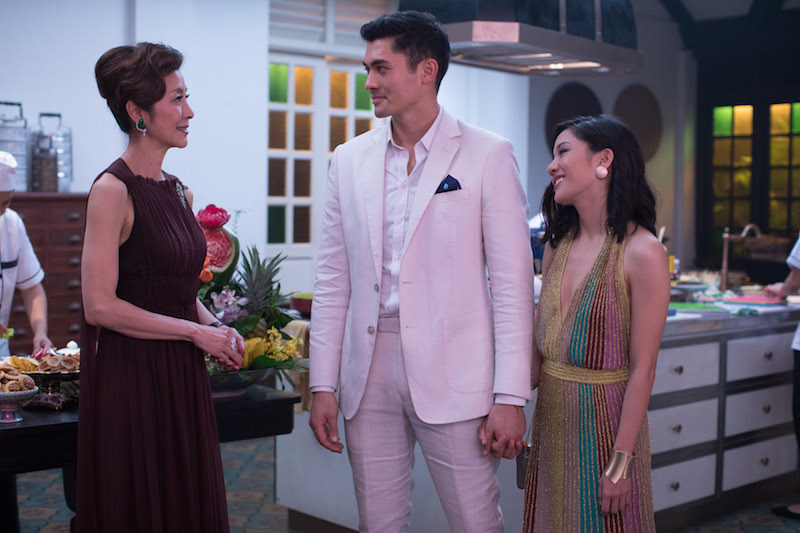
The following review contains mild spoilers.
Good romantic comedies are often described as confections, but Jon M. Chu’s Crazy Rich Asians feels more like a whole feast. It’s laugh-out-loud funny, swooningly romantic, deliciously decadent, and deeply touching. Oh, and it also provides enough “You go, girl” moments to wear out the snapping fingers on both of your hands.
The first of those moments comes right away. It’s 1995. A Chinese family arrives at a hotel late night in London. It’s raining and the kids have muddy shoes, making a mess on the floor. The elegant young matriarch (Michelle Yeoh) glides up to the desk and says that she has a reservation for a suite. The two hotel workers look her up and down with some disdain. They tell her no rooms are available. (“Have you tried Chinatown,” one sneers.) The matriarch runs to a phonebooth to make a call in the rain—they wouldn’t even afford her the courtesy of letting her use the hotel phone—and a few minutes later there’s a flurry of activity. The owner of the hotel comes downstairs in his pajamas, greets the matriarch, whose name is Eleanor Young, like an old friend and announces that the Young family has bought the hotel.
Mic. Drop.
This scene is brilliant in many ways. It provides the audience with immediate gratification, in a film that is positively dripping with satisfying moments. It establishes how rich the Youngs are. And it gives a chance to root for Eleanor Young, but also see how formidable she is. This is a woman who is NOT to be trifled with.
Cut to present day. Rachel Chu (Constance Wu), a self-possessed and thoroughly modern young Asian woman, is teaching game theory to a class at NYU. From the wings of the classroom, her dishy boyfriend (Henry Golding) walks in—beaming. He’s totally smitten.
Later, the two grab a drink and he asks if she’ll go East with him. “The East Village?” she asks. No, he says, Singapore. Turns out, he’s the best man in his friend’s wedding and he thinks it’s the perfect opportunity for Rachel to finally meet his family. She hesitates, consults with her beloved mother (Tan Kheng Hua), and ultimately decides to go, at least partly because her college bestie, Peik Lin Goh (a scene-stealing Awkwafina, giving us Asian Thelma Ritter realness), lives there. It’s decided.
On the plane, they get first class, which Rachel at first thinks is a mistake. Her boyfriend modestly mentions that his father does some business with the airline. She’s beginning to sense that he’s rich. But she has no idea.
In Singapore, she heads to Peik Lin’s house, which is opulent by any measure. The family, including father Wye Mun (Ken Jeong), is loud and warm and nouveau riche. (Let’s just say the décor is Trump Tower chic.) Peik Lin’s frumpy younger brother mouths the words “I love you” to Rachel across the table. Her adorable twin sisters giggle over how skinny Rachel is. There’s lots of familial laughter.
But they are silenced when they find out the name of Rachel’s beau: Nick Young. The Youngs are the richest family in Asia, they explain. Not just rich, but crazy rich. And Nick is their precious eldest son.
You can guess where the film goes from there. Eleanor is Nick’s mom and she does not approve of Rachel. Yes, partly because Rachel doesn’t come from wealth (much to the bafflement of Nick’s cousins: “Do you hail from the packing peanut Chus?” asks one, trying to make sense of things), but also because she sees her as a threat to Nick’s return to Singapore and inevitable takeover of the family business. (In Eleanor’s mind, all Americans are shallow and selfish, always pursuing happiness over duty.) What’s more, a lot of the women in Nick’s Singapore social circle are mean girls, who see Rachel as some sort of American gold digger.
The film is ultimately about Rachel finding her power, staying true to who she is, and standing up to Nick’s imperious mother and grandmother. It’s also about the balance between family sacrifice and self-fulfillment. Along the way, the film gives us everything we could possibly want: beautiful clothing, outrageous parties, Asian food porn, gorgeous men and women, and acid-dipped one liners. In the end, though, it would all be for naught if the film didn’t have heart and it does. We care deeply about these characters—and the film does, too.
All hail director Chu, who keeps the thing gliding along like it’s on ice, making the whole swirling, delectable enterprise look easy. Trust me, people, rom-com perfection like this is earned.
